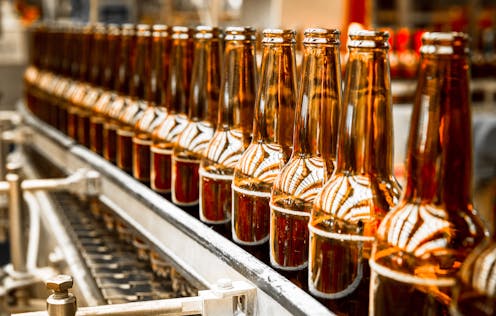Australia should follow Ireland's lead and add stronger health warning labels to alcohol
- Written by Emmanuel Kuntsche, Director of the Centre for Alcohol Policy Research, La Trobe University

From August 2023[1], Australian beer, wine, spirits and pre-mixed drinks have to warn of the harms of drinking alcohol while pregnant[2]. But they don’t have to mention the other harms of alcohol for the wider population.
Ireland recently signed legislation[3] to introduce tougher alcohol warning labels, to warn about the risks of liver disease and fatal cancers from drinking alcohol. These will be in place from 2026.
Considering the ongoing efforts of the industry to undermine the introduction of effective alcohol labelling[4] worldwide, the Irish example is an important victory for public health.
In Australia, it’s time to put consumer health and rights before commercial interests and warn people drinking and buying alcohol of the risks.
Read more: Trying to cut back on alcohol? Here's what works[5]
Educating consumers about the health risks
Alcohol causes more than 200 diseases, injuries and other health conditions[6].
There is strong evidence that from the first drink, the risk of various cancers (of the breast, liver, colon, rectum, oropharynx, larynx and oesophagus) increases[7]. This is because[8]:
ethanol (pure alcohol) and its toxic by-product acetaldehyde damages cells by binding with DNA, causing cells to replicate incorrectly
alcohol influences hormone levels, which can modify how cells grow and divide
direct tissue damage can occur, increasing the absorption of other cancer-causing substances.
Alcohol use kills more than four Australians[9] a day (the highest rate in the past decade) and results in A$182 million of avoidable costs[10] per day.
Yet only half of Australians know drinking alcohol can cause cancer[11].
Research shows[12] mandatory health labelling is an important way to increase awareness and should form part of a comprehensive alcohol control strategy[13].
Countering industry influence
The alcohol industry currently uses alcohol labels and packaging as a marketing and branding tool. Alcohol warning labels help counter these marketing messages.
Alcohol industry interests have so far succeeded in exempting alcoholic drinks from the usual consumer information requirements[15]. Under the international labelling guidelines[16], all processed foods must have all ingredients listed on the label. But alcohol industry interests have so far succeeded in these rules not being applied to alcoholic beverages[17].
Read more: No more than 10 standard drinks a week, or 4 on any day: new guidelines urge Aussies to go easy on the booze[18]
In Australia, the alcohol content and number of standard drinks must be listed on the product’s label[19]. However, there is no requirement, as for other foods and drinks, that ingredients (except for certain allergens such as milk or gluten) and nutritional information (energy, carbohydrates, and so on) be listed.
Aside from warnings to pregnant women to abstain from alcohol, there is no provision for consumer information about the risks of alcohol consumption on alcohol packaging. Yet such warnings are required for other hazardous substances taken into the body, such as tobacco.
How Ireland is leading the charge
Ireland is leading the world with its alcohol labelling. From 2026, drinks containing alcohol will have to inform consumers about the specific risks of liver disease and fatal cancers.
Labels will also have to notify buyers of the alcohol risks to pregnancy, the calorie content of the beverage, and the number of grams of alcohol it contains.
The new labelling move demonstrates[21] the government has prioritised reducing alcohol-related disease and has widespread support. A recent household survey[22] in Ireland found 81.9% of the more than 1,000 participants supported the introduction of health warning labels on alcohol.
Barriers to overcome in Australia
In 2020, in the face of intense pressure from industry groups, the Australian government decided on new labelling requirements for alcoholic beverages, but only to warn about the risks of drinking during pregnancy[23]. From a public health point of view, this was a mediocre compromise.
Australia is currently considering introducing energy content (kilojoule) labelling on alcoholic beverages. This would be a positive step and but it is as far as Australia seems willing to go for now. There are no plans for Australia to follow Ireland’s lead.
Read more: To reduce harm from alcohol, we need Indigenous-led responses[24]
Some countries seem to be gearing up[25] to use the World Trade Organization’s processes to oppose Ireland’s new labels.
Australia previously opposed[26] enhanced alcohol warning labels Thailand proposed, at the same time Australia was seeking international support for its tobacco plain packaging laws. This time, Australia should prioritise the public’s health over commercial interests and support Ireland’s alcohol warning messages in the World Trade Organization.
References
- ^ August 2023 (www.foodstandards.gov.au)
- ^ harms of drinking alcohol while pregnant (theconversation.com)
- ^ recently signed legislation (www.theguardian.com)
- ^ effective alcohol labelling (www.sciencedirect.com)
- ^ Trying to cut back on alcohol? Here's what works (theconversation.com)
- ^ more than 200 diseases, injuries and other health conditions (www.who.int)
- ^ increases (adf.org.au)
- ^ because (www.cancervic.org.au)
- ^ more than four Australians (www.abs.gov.au)
- ^ A$182 million of avoidable costs (ndri.curtin.edu.au)
- ^ can cause cancer (adf.org.au)
- ^ Research shows (www.jsad.com)
- ^ alcohol control strategy (fdslive.oup.com)
- ^ Shutterstock (www.shutterstock.com)
- ^ consumer information requirements (fdslive.oup.com)
- ^ international labelling guidelines (www.fao.org)
- ^ not being applied to alcoholic beverages (movendi.ngo)
- ^ No more than 10 standard drinks a week, or 4 on any day: new guidelines urge Aussies to go easy on the booze (theconversation.com)
- ^ listed on the product’s label (www.foodstandards.gov.au)
- ^ Shutterstock (www.shutterstock.com)
- ^ demonstrates (www.cancer.ie)
- ^ household survey (academic.oup.com)
- ^ risks of drinking during pregnancy (theconversation.com)
- ^ To reduce harm from alcohol, we need Indigenous-led responses (theconversation.com)
- ^ gearing up (www.ibec.ie)
- ^ previously opposed (pubmed.ncbi.nlm.nih.gov)

















